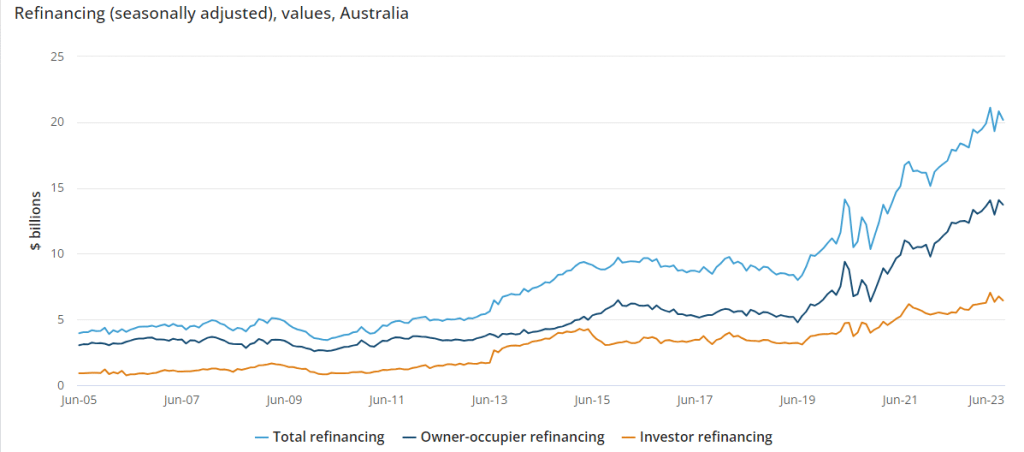Refinancing a mortgage in Australia frequently indicates a forward-thinking financial move. From obtaining more favourable interest rates, minimising monthly payments, to accessing the equity in your home, the advantages abound. Yet, when your credit rating isn’t top-notch, the process can become complex. Still, with appropriate tactics, Australian homeowners with subpar credit scores can effectively tackle this venture. This detailed guide on how to refinance mortgage with bad credit seeks to shed light on its complexities.
Understanding The Credit System in Australia
In Australia, comprehending the credit system is vital before embarking on the refinancing journey. Your credit score, ranging between zero and either 1,000 or 1,200 depending on the reporting agency, is derived from your credit report. This report reflects factors such as the total amount you’ve borrowed, your number of credit applications, and your punctuality in repayments. A higher score positions you as a lesser risk to lenders, potentially garnering more favourable deals and financial savings. Conversely, a lower score can hinder your chances of securing loans or credit. This report, detailing your credit rating, the financial products you possess, and your repayment track record, guides credit providers in their decision to grant you
Credit Scores in Australia
In Australia, credit scores typically range from 0 to 1,200. According to Experian, one of the country’s major credit reporting agency:

Excellent: 800-1,200
Very Good: 700-799
Good: 625-699
Average: 550-624
Below Average: 0-549
If you fall into the “Below Average” or “Average” categories, it might be considered bad or poor credit. In such cases, looking into options to refinance a mortgage with bad credit becomes essential, although it can make the refinancing process more complicated.
Statistics on Australian Homeowners with Bad Credit
Research suggests that a significant portion of Australians has less-than-perfect credit. A 2020 survey by Finder revealed that 1 in 5 Australians has defaulted on a loan, and 13% of respondents admitted they were rejected for a financial product due to their credit history.
These numbers indicate that there’s a considerable segment of homeowners who might be seeking to refinance or even buying a home with bad credit, facing challenges with not-so-ideal credit ratings.

The Challenges of Refinancing Mortgage With Bad Credit
In Australia, opting to refinance a mortgage often symbolizes a savvy financial decision. It can lead to attractive interest rates, reduced monthly repayments, and the opportunity to tap into your home’s equity. However, if your credit score leaves much to be desired, the refinancing journey might be challenging. Nevertheless, with the right strategies, Australians with below-average credit can successfully navigate this path. This article delves into the intricacies and gives insights into how to refinance mortgage with bad credit
Higher Interest Rates
Image ALT tag: high-interest rate for refinance mortgage with bad credit
Having a lower credit score usually means you’ll face steeper interest rates, making the refinancing option less financially appealing. When your credit is not great, lenders and mortgage brokers in Sydney perceive you as a riskier client. To offset this risk, they often provide loans that come with heftier interest rates. This increase can substantially inflate the total mortgage cost, leading to pricier monthly instalments and possibly rendering refinancing less favourable.
Increased Examination
In today’s evolving financial environment, borrowers can expect a more in-depth vetting process. Financial institutions are becoming more cautious, frequently demanding extensive documentation that corroborates every aspect. This entails, among other things, robust proof of earnings, exhaustive financial records, and evidence of consistent, responsible borrowing.
Fewer Choices
When it comes to refinancing, a weak credit score can severely restrict the opportunities for borrowers. Not all refinancing programs or deals out there are tailored to support or benefit those with tarnished credit histories. Typically, mainstream banks and lenders favour those with robust credit, sidelining those with weakened scores. This often translates to less favourable interest rates, tougher conditions, or even outright rejections. However, understanding why refinance a home loan can guide individuals in navigating these challenges and finding solutions that align with their financial needs.
Refinance Mortgage With Bad Credit: Strategies for Success
Navigating the world of home loan refinancing can be challenging, particularly if you have a less-than-stellar credit history. The general assumption is that bad credit will prevent individuals from securing a favourable refinancing deal or even being approved at all. However, all hope is not lost. With the right strategies and a clear understanding of the options of refinance mortgage with bad credit available, those with bad credit can still find viable refinancing opportunities in Australia.

Seeking Specialist Lenders
Mainstream lenders, such as big banks, tend to have stringent credit requirements. This often makes it difficult for individuals with bad credit to secure loans through these institutions. However, Australia boasts a diverse financial landscape, and there are specialist lenders who cater specifically to the needs of those with bad credit. These lenders recognize that one’s financial journey is more intricate than just a credit score. They might consider other aspects of your financial history to provide more tailored loan products. Also seeking refinancing mortgage broker can be the key to unlocking refinancing options you might have thought were out of reach due to bad credit refinancing challenges.
Demonstrate Financial Responsibility
It’s essential to remember that your credit score is just one facet of your financial persona. Lenders look beyond scores to gauge the risk associated with loaning money. If you can demonstrate a recent history of timely payments, consistent savings, or stable employment, these can serve as positive indicators of your financial responsibility. While many wonder, “Can you refinance mortgage with bad credit?”, it’s possible that with the right factors in place, lenders may be more willing to consider your refinancing application.
The Power of a Cosigner
One effective strategy to bolster your refinancing application is to consider bringing a cosigner on board. A cosigner, preferably someone with a commendable credit history, agrees to back up your loan, essentially providing a safety net for the lender. This significantly reduces the risk for the lending institution and can greatly increase the likelihood of loan approval. However, it’s vital to ensure that both you and your cosigner understand the responsibilities and potential liabilities involved.
Increasing Home Equity
Equity plays a pivotal role in refinancing. Essentially, the more value you have built up in your home compared to what you owe, the better your position when seeking to refinance. Having substantial equity can serve as a buffer, reducing the lender’s risk, and making them more amenable to considering your application, even if you have a bad credit history. While building equity might necessitate waiting a bit longer before refinancing, the patience can pay off in terms of better rates and terms.
Shop Around for the Best Deal
Finally, the importance of shopping around cannot be stressed enough. Just as with any major financial decision, it’s crucial to research, compare, and assess multiple offers, including looking into banks that will refinance with bad credit to find the best fit for your situation. Each lender will have its own criteria, rates, and terms. By broadening your search and not settling for the first offer that comes your way, you enhance your chances of finding the most beneficial deal tailored to your unique circumstances.
Conclusion
The journey to refinancing a mortgage with a bad credit score can appear daunting. Yet, with informed strategies, understanding the available options, and proactive steps towards credit improvement, success is within reach. Australian homeowners should remember that their current credit score isn’t the end-all. With persistence and informed decision-making, the dream of a refinanced mortgage, even with bad credit, is attainable. Always research extensively and consider consulting with financial experts to ensure that the refinancing decision aligns perfectly with your financial goals.
Refinance Mortgage with Bad Credit FAQs
Q: Can you refinance with a bad credit score?
A: Yes, it is possible to refinance with a bad credit score, but it may come with challenges. Lenders often offer higher interest rates or less favourable terms to borrowers with lower credit scores. While options might be limited, some specialized lenders cater to individuals with poor credit. It’s essential to shop around, compare offers, and consider improving your credit score before refinancing to secure better terms.
Q: Is it possible to refinance my mortgage if I have bad credit in Australia?
A: Yes, while it can be more challenging, there are several options available for homeowners with bad credit to refinance their mortgage.
Q: Will I automatically get higher interest rates because of my bad credit?
A: Not necessarily, but it’s common for borrowers with lower credit scores to be offered higher interest rates. However, some refinancing programs, especially those designed for bad credit, may offer competitive rates.
Q: How can I improve my credit score before refinancing?
Some steps include reviewing your credit report for errors, paying down debt, ensuring timely bill payments, avoiding new credit applications, and seeking credit counselling for guidance.
Q: Does every credit application harm my score?
A: Each new credit application usually results in a hard inquiry, which can temporarily lower your score. Multiple inquiries in a short span can have a more significant impact. It’s advised to limit new credit applications when aiming to refinance.
Q: What is a credit utilization ratio, and why is it important?
A: Credit utilization ratio is the percentage of your total available credit that you’re currently using. It plays a significant role in determining your credit score. A lower ratio (using less of your available credit) is typically seen as positive by credit bureaus.
Q: Should I consult with a financial expert before refinancing?
A: It’s always a good idea to consult with a financial advisor or expert when making significant financial decisions, like refinancing. They can provide tailored advice and insights based on your unique situation.
Q: Are there specific mortgage programs tailored for individuals with bad credit?
There are specific mortgage programs, such as FHA loans or VA loans, designed to assist individuals with lower credit scores. These programs typically offer more flexible requirements, making refinancing more accessible for those with credit challenges.
Q: What are the common challenges faced by individuals with bad credit when attempting to refinance a mortgage?
A: Besides higher interest rates, challenges might include limited lender options, stricter qualification criteria, and potentially needing a larger down payment or more equity in the home.
Q: Is it better to wait and improve my credit score before attempting to refinance, or should I start the process now?
A: Although a higher credit score often translates to more favourable refinancing terms, if you’re in immediate need of refinancing, exploring available options is crucial. Simultaneously working on improving your credit while navigating the refinancing process can be a strategic approach for long-term financial benefits.
Q: Can I refinance with bad credit if I’ve previously missed mortgage payments?
A: Missing mortgage payments can affect your eligibility, but it’s still possible to refinance with bad credit. Discuss your situation with lenders who specialize in refinancing for individuals with credit challenges.